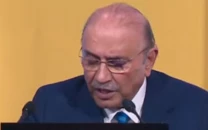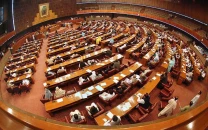In Sindh, maddeningly slow but steady reform on teacher hiring
Critics have plenty to say about the Reform Support Unit’s new system but it is forging ahead.

Critics have plenty to say about the Reform Support Unit’s new system but it is forging ahead.
The Reform Support Unit (RSU) has the mandate to reform teacher hiring rules. The RSU is part of the government’s education and literacy department, so the good news is that its involvement signals a policy shift at the highest level (with a little donor help along the way).
The new process is simple. The government advertises its schoolteacher posts. Candidates apply, and they are asked to sit a test held by the National Testing Service. “We want to make this process transparent by enlisting the services of self-reliant and self-sustain[ing] premier testing organisations such as the Institute of Business Administration and the National Testing Service,” explained Zameer Khoso, a senior RSU manager.
Once out, the test results are displayed publicly as a merit list. Then the district recruitment committees step in. They consist of the district education officer, district officers for primary, secondary and elementary schools, the deputy commissioner, educationists and people from the private sector of the area.
“The committee reviews the results and determines the eligibility of the candidates by checking their credentials and scrutinizing their degrees,” added Khoso. The committee gives the RSU a detailed report, which the unit shares with the donor. After the donor endorses the results, the RSU sends back the list of names to the committee and the teachers can get the jobs. Rejected candidates have the right to appeal.
While this process can seem long-winded, its merit lies in a full circle of vetting. This is one way to eventually create a system that prevents what happened in the case of Mashooq S in Dadu. This man surprised the school administration and the people in his area by bagging the job of a junior schoolteacher at a time when there was a freeze on government hiring in 2013. It emerged that he had backdated his appointment letter to 2011.
Mashooq S’s case demonstrates that people will sometimes try to cheat the system — but this does not mean the system is a bad one. Actually, Punjab and Khyber-Pakhtunkhwa are successfully hiring their teachers in much the same way as Sindh. It appears, though, that delays here are frustrating candidates, which is understandable for any job applicant. But when government machinery is involved, and especially a donor watchdog, the paper doesn’t always move as fast as one would like it to.
Take the case of Amanullah M, an MA in Islamic Culture, also from Dadu. He said he is among the hundreds of candidates who sat the test for the primary teacher jobs in 2012 and scored high. “The merit list prepared by the National Testing Service was ready a few days after the test, but we have yet to receive our job appointment orders,” said Amanullah. “Not just me, but a lot of candidates have been running around, trying to get through to someone who can help, from the secretary to the education minister.”
There is a backlog of around 16,000 letters for teachers whose posts were advertised in 2012. According to the president of the Government Secondary Teachers Association, Ashraf Khaskheli, some secondary and higher secondary teachers have received their letters but primary teachers are still waiting.
For his part, the RSU’s Khoso explained that while they did indeed run into technical hitches, and a lot of time was eaten up in correspondence with the donor on policy, they are reviewing where they went wrong. “And next time the recruitment process will go faster.” They are also looking into ways to plug loopholes. “The oral test created controversies of favouritism that is why we have ended it,” he explained. They now just rely on a written test.
Hiring hiccups aside, the Sindh government has moved forward on other fronts to improve its cadre of teachers. Gone are the days of cushy life-long guarantees of a salary whether you went to class or not. Now the government will only appoint teachers on three-year contracts. “The contract may be extended,” explained Education Secretary Fazullah Pechooho, adding that he and the senior minister for education cannot interfere as the entire exercise is being undertaken by the independent RSU.
The RSU’s efforts are being buttressed by anti-corruption authorities that are investigating dozens of cases in which extra teachers were hired without sitting the test or by faking their appointment letters. According to one estimate, the numbers could be as high as 30,000. “We have written to the Accountant General to stop their salaries and have ordered an enquiry into who has done this,” said Minister for Education Nisar Ahmed Khuhro while speaking to The Express Tribune. The loophole here was the lack of a written test. District recruitment committees were hiring Arabic, Sindhi language, drawing and physical education teachers without one. Happily for the RSU, though, they had nothing to do with it, as Khoso confirmed. It is safe to assume though that no one ever expected a reformation to come without resistance.
With writing by Mahim Maher
Published in The Express Tribune, March 4th, 2015.



















COMMENTS
Comments are moderated and generally will be posted if they are on-topic and not abusive.
For more information, please see our Comments FAQ